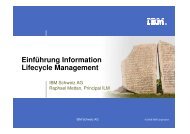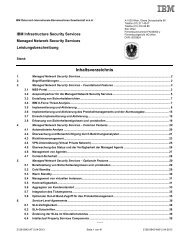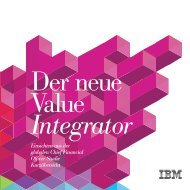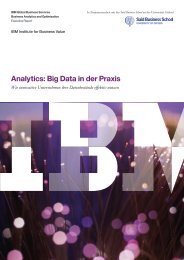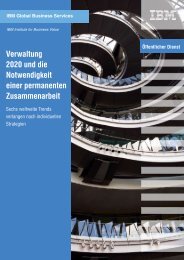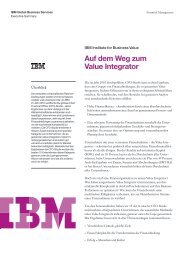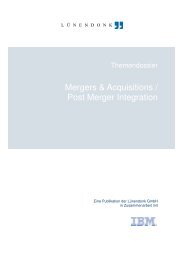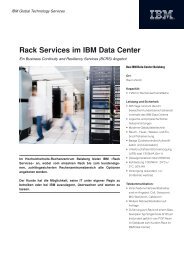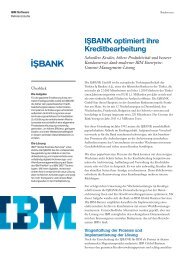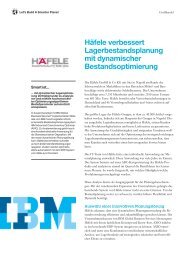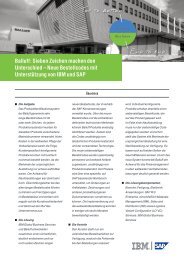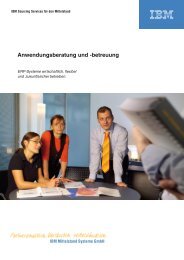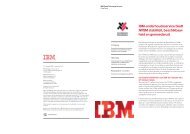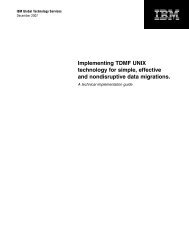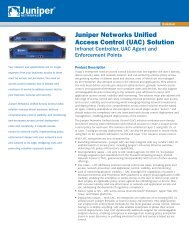Making Connections: Using SOA to enable collaboration in travel - IBM
Making Connections: Using SOA to enable collaboration in travel - IBM
Making Connections: Using SOA to enable collaboration in travel - IBM
You also want an ePaper? Increase the reach of your titles
YUMPU automatically turns print PDFs into web optimized ePapers that Google loves.
Figure 5 shows a number of different types<br />
of transactions that support several different<br />
processes. First, we show regulation and<br />
policy <strong>in</strong>formation available <strong>to</strong> systems that<br />
request them us<strong>in</strong>g regulation <strong>in</strong>formation<br />
services (such as “get regulations for<br />
product”). At this time, there are no standards<br />
for the format and content of these regulations,<br />
so for this example, assume these regulations<br />
are <strong>in</strong> the form of a text list that can be added<br />
<strong>to</strong> a bill of lad<strong>in</strong>g or other required document.<br />
Almost all participants <strong>in</strong> the trad<strong>in</strong>g process<br />
require access <strong>to</strong> this <strong>in</strong>formation provided by<br />
national cus<strong>to</strong>ms agencies.<br />
The entire set of regulation <strong>in</strong>formation<br />
services can operate <strong>in</strong> this manner<br />
– return<strong>in</strong>g the requested <strong>in</strong>formation systematically<br />
<strong>in</strong> text format. As an example, buyers,<br />
cus<strong>to</strong>ms agents and other participants <strong>in</strong><br />
the trade process would be able <strong>to</strong> collect<br />
cus<strong>to</strong>ms <strong>in</strong>formation electronically us<strong>in</strong>g the<br />
<strong>SOA</strong> services <strong>to</strong> “get regulations for country”<br />
and then, for the product be<strong>in</strong>g traded, “get<br />
regulations for product” specific <strong>to</strong> the country<br />
it is go<strong>in</strong>g <strong>to</strong> or com<strong>in</strong>g from. Banks can<br />
access these regulations and <strong>in</strong>clude them<br />
<strong>in</strong> letters of credit. Insurance companies can<br />
<strong>in</strong>clude this <strong>in</strong>formation as part of a policy<br />
provid<strong>in</strong>g confirmation that policies are set for<br />
the correct coverage amounts. Even this most<br />
basic access <strong>to</strong> the <strong>in</strong>formation can lend value<br />
<strong>to</strong> the process.<br />
Second, we show that tariffs and duties are<br />
made available <strong>in</strong> the same manner. The <strong>in</strong>formation<br />
requester would provide the needed<br />
<strong>in</strong>put such as source and dest<strong>in</strong>ation as well<br />
12 <strong>IBM</strong> Global Bus<strong>in</strong>ess Services<br />
as the product be<strong>in</strong>g acquired, and get the<br />
tariff or duty <strong>in</strong>formation returned. This <strong>in</strong>formation<br />
is critical <strong>to</strong> retailers seek<strong>in</strong>g goods from<br />
global sources, as duties and tariffs add <strong>to</strong><br />
the landed costs and ultimately impact their<br />
profitability. But other parties, such as cus<strong>to</strong>ms<br />
agents, also require access <strong>to</strong> this <strong>in</strong>formation.<br />
Third, the same <strong>SOA</strong> services provid<strong>in</strong>g<br />
regulation and revenue <strong>in</strong>formation <strong>to</strong> trade<br />
participant systems are also used <strong>to</strong> provide<br />
this <strong>in</strong>formation <strong>to</strong> a cus<strong>to</strong>ms Web portal.<br />
Internet-based <strong>in</strong>formation access is provided<br />
for the smaller trade participants or for those<br />
without systems connectivity. Regulations are<br />
available onl<strong>in</strong>e and often as separate documents.<br />
Last, we <strong>in</strong>clude a future possibility for the<br />
po<strong>in</strong>t when <strong>SOA</strong> <strong>in</strong>frastructure becomes<br />
more widely implemented. <strong>Us<strong>in</strong>g</strong> the same<br />
approach as the <strong>in</strong>formation services<br />
described previously, this approach positions<br />
trade participant systems <strong>to</strong> submit the full<br />
trad<strong>in</strong>g package <strong>to</strong> cus<strong>to</strong>ms electronically,<br />
perhaps first request<strong>in</strong>g <strong>to</strong> “validate trade” and<br />
eventually request<strong>in</strong>g <strong>to</strong> “approve trade” by<br />
send<strong>in</strong>g the required <strong>in</strong>formation directly with<br />
the approval request us<strong>in</strong>g the <strong>SOA</strong> service.<br />
This beg<strong>in</strong>s <strong>to</strong> pa<strong>in</strong>t the possibility of true, end<strong>to</strong>-end<br />
transaction <strong>in</strong>tegration that exists <strong>in</strong><br />
other <strong>in</strong>dustries. Only a few of the participants<br />
actually submit data <strong>to</strong> the governments, but<br />
volumes and complexity still present a strong<br />
case for future implementation once <strong>SOA</strong> <strong>in</strong>frastructure<br />
is <strong>in</strong> place and ready <strong>to</strong> be leveraged<br />
by <strong>in</strong>creased use.



